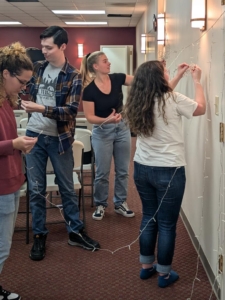At a Forum this past Thursday, Mr. Argus Wiley, president and CEO of Red Door Brands, spoke on what it means to live ‘your best life’ and how to achieve it. “You are the future of this world! is a phrase often directed at the younger generation,” Mr. Wiley began. This may seem stressful, and keep people from succeeding. It really is a lot being asked of us, yet there are still people who take on the burden of this knowledge and still strive to live the best life they can. There has been and always will be this challenge for young people, but there is a necessity to go out and make the absolute best of it!
When is your best life?
He asked us if we believe that our best life is behind us, if we’re living it now, or if it is still yet to come. One could argue that being able to live with minimal worries means having a personal chef or being surrounded by people who love us – which we might think is our “best life.” Doesn’t this sound like our childhood? For others, their best life means moving out of their parent’s house.
The odds of living the best life
Mr. Wiley presented statistics from a quick Google search he conducted on how most people in the United States live. This helped to solidify within our minds the reality of the work needed to achieve our best lives as opposed to simply believing we can let it happen.
7.29% of people become a millionaire
11.5% will end up living in poverty
83% of people will get married
50% of those who get married will stay married
44.4% will become obese
16.5% will be an addict of some sort
22.8% will suffer a mental ailment
53% of people report being unhappy in their life.
Looking at this, it is more likely for us to live in poverty than to become a millionaire. He wanted to drill into our minds the severity of these reports. “You shouldn’t brush this off just because we are in the church, don’t think that can’t happen to me.” We have to put in the work daily to ensure that we do not become one of these depressing statistics.
Keys to assist in achieving the best life
- Get a mission statement
A personal mission statement can give us guidance on where we are going. “People have the drive for success, but lack the sense of direction to achieve the destination.” Mr. Ames has a sermon titled What is Your Mission Statement, that Mr. Wiley recommended. Businesses, successful people, and the wealthy all have mission statements, and we need to as well.
- Show up
Woody Allen once said that showing up is 80% of success. Showing up is the act of making up your mind to follow through and do something. Even the little things matter; the simple act of making your bed in the morning is showing up.
- Do Hard Things
Human nature has the desire to quit when things become difficult, thus we need to work to push through the difficult times that will appear in each and every one of our lives. Mr. Rod McNair gave a sermon titled Do Hard Things that goes into deeper detail.
- Never stop learning
Author Bryan Tracy said, “Reading a book a week on one specific topic for 7 years will make someone an expert in that specific area.” If we stop growing and learning, then we ultimately will fall within the earlier-mentioned statistics.
- It is all your fault
We all will end up with the results we deserve because of what we earn through our actions. We cannot blame others for what happens to us.
- Pray along the way
Prayer is a vital must, yet at times we may also have to pray on the journey. Mr. Wiley described a story about two kids who missed the school bus and saw it riding off into the distance. One instantly drops to his knees and asks God for the bus to stop, while the other immediately takes off running while praying that he can catch up to it. The only one able to catch the bus was the one praying while he ran. Prayer is necessary, but we also need to put in the work to achieve our goals.
“It will take all of these strategies to become successful in living the best life.”
We have all of these opportunities to live the best life, now what are we going to do with them?



